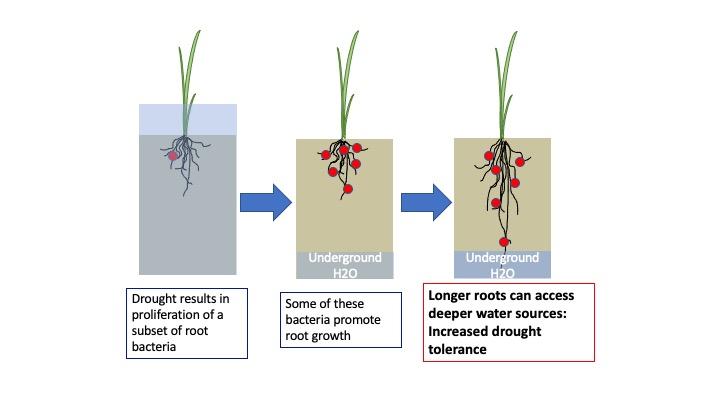
Credit: Sundaresan lab, UC Davis
Drought can have a lasting impact on the community of microbes that live in and around roots of rice plants, a team led by UC Davis researchers has found. Root-associated microbes help plants take up nutrients from the soil, so the finding could help in understanding how rice responds to dry spells and how it can be made more resilient to drought. The work is published July 22 in Nature Plants.
The root microbiome of irrigated rice plants goes through a sequence of changes as the plants grow and stabilizes when they flower. The sequence of changes in the root microbiome is consistent for a particular rice strain and geographic location. Previous work has shown that when a growing rice plant is deprived of water, it hits pause on the succession of changes in the root microbiome.
Venkatesan Sundaresan, distinguished professor of plant biology in the UC Davis College of Biological Sciences and colleagues looked at changes in rice root microbes over time when plants were deprived of water for 11, 21 or 33 days. This kind of intermittent drought condition is more common in rain-fed crops than terminal drought, Sundaresan said.
As expected, the microbe community changes when water is taken away. More surprising is that the changes persisted for weeks after plants were watered again.
“Rice plants carry a ‘memory’ of the drought episode in their root microbiota, so that plants that have experienced drought can be distinguished solely on the basis of their microbiomes,” Sundaresan said.
Promoting root growth
The team was able to culture and sequence the most abundant of these persistent microbes. It was a species of Streptomyces that promotes growth of plant roots, a classic response to drought. The bacteria’s DNA includes genetic code similar to plant genes for the growth hormone auxin.
“The persistence of changes to the microbiome means that root elongation continues even after drought has ended. This allows the roots to be better prepared to tap deep water,” Sundaresan said. For some drought tolerant rice cultivars, after a drought episode, the roots will continue to grow long enough to penetrate the hardpan, he said.
The persistent changes also mean that the microbiome response will be more rapid the next time drought hits, because it is altered from the first drought.
As extreme climate events become more common, crops are likely to experience more intermittent droughts, the authors note. Understanding what makes plants more resilient to drought conditions could help reduce crop losses.
###
Additional authors on the paper are Christian Santos-Medellin, Zachary Liechty, Joseph Edwards and Bao Nguyen, UC Davis Department of Plant Biology; and Bihua Huang and Bart Weimer, Department of Population Health and Reproduction, 100K Pathogen Genome Project, UC Davis School of Veterinary Medicine. Sundaresan also has a faculty appointment in the Department of Plant Sciences, College of Agricultural and Environmental Sciences.
The work was supported by grants from the NSF and U.S. Department of Agriculture.
Media Contact
Andy Fell
[email protected]
Related Journal Article
http://dx.




